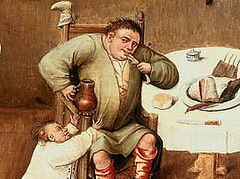For many believers, repentance is a natural and essential element of spiritual life, a heavenly gift, and a healing medicine indispensable in spiritual warfare. Not only regular parishioners hurry to Confession for a second chance, but also “Paschal Christians” subconsciously feel the need to approach for confession once a year and talk to the priest about their pressing issues. However, not everyone understands what repentance truly is, what its secret is, or how it works, if we can be put it that way. Months and years pass, people repent and repent, but they come back with the same sins. A person gets the feeling that he is standing still or spinning in a wheel: there is movement, but no progress is seen. Finally, doubts and thoughts come: Why repent if I will sin again? What is the point, and is there one at all?
First, it is necessary to understand that God does not command anything meaningless. It would be absurd to claim that God has established “ineffective” sacraments without providing a guarantee. He does not require our labor for the sake of labor itself. He desires our salvation and the restoration of human dignity so much that He did not spare His Son to achieve this goal. This very act shows how serious and important the issue of our salvation is to God. Therefore, every one of His commandments is supremely purposeful and wise. If there is indeed meaning in divine prescriptions, then the problem lies within us. Perhaps it is we who are doing something wrong.
Indeed, we confess specific sins, we identify and carefully record them, but we forget about the causes of sins—the passions. It is the passions, that is, persistent habits and vicious tendencies that, through frequent indulgence, become part of our very nature, which form the massive base of the iceberg, the tip of which we bring to Confession. Sin is merely the manifestation of a particular passion, its consequence, a sprout that has a deep and branching root – the passion. In our piety, we are like unskilled workers assigned to clear a field by sunset. By plucking the tops of the weeds and neglecting the roots, we survey the cleared area with satisfaction and rejoice at the completed task. We can report the work done and sleep peacefully. But soon it rains, creating favorable conditions for growth, and our weeds rapidly and in even greater numbers fill the field.
To illustrate, consider a simple example from daily life. Suppose a person works in a supermarket. He knows that in one of the refrigerators in the warehouse, they store “unfit” and “expired” dairy products. He also knows that some of this “unfit” stock will be returned, some will spoil, and some will be taken by other employees. Therefore, when he leaves, he occasionally takes a bottle of milk, some cottage cheese, or yogurt with him. And since he needs to partake of Communion for the feast day, he confesses this sin along with others during Confession. But then he returns to his usual environment and continues stealing from the warehouse, only to “confess” again at the next feast day. The person genuinely feels that what he is doing is wrong, but not as wrong as the actions of murderers and rapists. He reveals only the obvious sin but does not want to look deep into his heart to understand that the cause of his theft is a hidden and ingrained habit of constantly justifying and excusing himself. If he delved deeper, he would see that he internally justifies and permits his theft. After all, he works diligently, covers shifts for sick colleagues, works overtime when circumstances demand it, and generally feels undervalued and underpaid. He has long made a deal with his conscience and morally justified his theft to himself. Such a person will continue to list the number of stolen bottles at Confession, but deep down he considers himself deserving of this small reward.
Here’s another example. A person repents for his anger. This passion torments him and gives him no peace. His loved ones, subordinates, and random people suffer from it, but above all, he himself suffers. He repeatedly confesses this sin, listing all those he yelled at and under what circumstances, but the situation does not change. It does not change because the person needs to fight not the results of the passion, but the passion itself.
Since passion is a habit, it must be countered with another habit. The reasons for our dissatisfaction with others can include our pride and arrogance, envy, inability to sincerely rejoice in the success of others, lack of patience, inability to remain silent, and generally our inability to accept people as they are, with their personality traits and shortcomings. At the same time, we want to be accepted as we are, without being asked to change. Until a person learns to pray for others, to rejoice with those who rejoice, and to at least support others with sympathy in their troubles, their Confession will remain just a list of people they lashed out at.
Someone might repent of lustful sins but neglect impure fantasies and ignore the habit of looking at “explicit” images on the Internet. Another repents of other sins they fell into due to habitual and uncontrolled judgment of others. No matter what sin we use as an example, the meaning is the same: Sin is only an external manifestation of internal causes rooted in the human heart. In other words, sin is an action, while passion is its motive. It is no coincidence that one of the Fathers says that the mind is easily polluted but also easily cleansed. The heart, however, is long to be polluted and long to be cleansed. This is the difference between sin (an action) and passion (a habit).
“Passion, fulfilled in reality or ingrained in the soul through long-term sympathy for it and nurturing it, gains dominion over a person. It takes a long time, bloody ascetic labors, and special divine mercy and help to overthrow the yoke of passion, voluntarily accepted” (St. Ignatius Brianchaninov). However, the problem is not only in the difficulty of fighting passions but also in the fact that not everyone can see this connection. A person may confess sins for decades without understanding where they come from and why they do not go away. It takes a lot of experience and gracious help to come to the right understanding of the cause-and-effect relationship. Although, the monastic saints laid out the principles of lawful struggle and proper repentance many years ago:
“Only the one who zealously eradicates the causes and occasions of sins can uproot passions; for example, if someone falls into fornication or adultery because of acquaintance with women, they must avoid even looking at them; if someone gives in to intemperance due to excessive food and drink, they must sober themselves with strict abstinence; if greed leads someone to perjury, theft, murder, and blasphemy, they must eradicate the object of their avarice; if someone succumbs to anger out of pride, they should uproot their arrogance with humility. Thus, any vice can be erased if its cause and occasion are removed—for in this way, the sins committed can be forgotten” (St. Abba Pinufius).
Therefore, our hypothetical merchandiser from the supermarket needs to stop deceiving and justifying himself. He needs to come to his senses in a gospel-like way, conduct a ruthless and impartial analysis of his actions and motives. He needs to come to the realization that this is not permissible: “These products are not my property, and I have no right to take them. No reason can justify my theft.” As soon as he solidifies this thought, feels it, and fully agrees with it, the theft will cease by itself, as the root (its cause) will be uprooted. But this enlightenment may take years. It will be a great blessing if a person can realize the reasons for their wrongdoing before being caught red-handed.
The Sacrament of Confession is a great and generous gift from God. Happy is the one who understands this, and unhappy is the one who neglects it.
However, one must approach it honestly, with a sincere heart, without a trace of self-pity and self-justification. The confessional analogion is our Golgotha, on which we must crucify our self-love and self-justification. God accepts the repentance of any person, and in this sacrament He grants the grace to overcome the passions. But we do not make use of it. Instead, at best, we turn repentance into a report on our sinful deeds, and at worst, we invent reasons to justify our actions and even accuse the sacrament of Confession of being ineffective. The question, “Why should I repent if I know I will only sin again?” is indicative in this sense. It reveals the spiritual ignorance of a person unfamiliar with true repentance, demonstrating his veiled cunning and unwillingness to change. It is as if the person is saying, “I repent, but repentance does not work.” True are the words: “He who wants to act finds a way, he who does not want to act, finds an excuse” (Socrates).
God, for whom there are no unforgivable sins, is Good and Merciful. But He expects from us self-denial, the absolute and uncompromising abandonment of ungodly thoughts and deeds. Self-justification and false shame devalue repentance, making us like Adam, who blamed God for his fall. God-pleasing repentance does not fear temporary shame. On the contrary, it prefers it to the eternal shame from which there will be no salvation—forever. Sincere and honest repentance can work miracles, heal the old wounds of the soul, make a person like the wise thief, and lead him into paradise along with the righteous who have pleased God through repentance.





